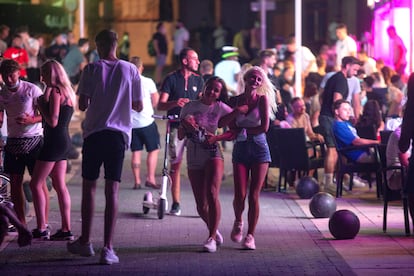Parties and nightclubs: The new hotspots of coronavirus outbreaks in Spain
Several regions have set limits on capacity on establishments and shut down nighttime venues in a bid to prevent new surges in case numbers

A coronavirus outbreak at a nightclub in Córdoba, in Spain’s southern region of Andalusia, has led to a large spike in infections, with 73 confirmed cases on Sunday, double the number reported the previous day.
Around 400 people attended the nightclub Babylonia to celebrate the end of the school year on July 10. A week later the first case was detected, with 670 contacts under medical surveillance. The outbreak is now the largest of the 21 active in Andalusia, and the one of the biggest in Spain. The spike in infections is one of several related to nightclubs and parties in Spain, which authorities consider one of the greatest risks in the fight to slow coronavirus contagion.
According to Fernando Simón, the director of the Health Ministry’s Coordination Center for Health Alerts, infections at these sites “could involve people from multiple places that cause a diffuse transmission everywhere that they have been.”
Nighttime venues tend to be poorly ventilated, and the volume of the music means you have to speak loudly, which has been documented as a risk factorJoan Ramón Villalbí, spokesperson of the Spanish Public Health Association
“What’s more, the risks are much more significant in this context, than in another type of group where outbreaks happen. That’s why we repeat the request: one has to have fun, but one has to learn to do it carefully, in another way,” said Simón last Friday.
Not long after his press conference, the figures began to show the extent of the risk. In addition to the outbreak in the nightclub in Córdoba, Covid-19 cases were detected after an end-of-year party in Zarautz in the Basque Country, around 20 people aged between 17 and 20 were put under medical surveillance due to an outbreak linked to a party, and more infections were traced back to nightlife activities in the regions of Murcia and Valencia.
In a bid to prevent further outbreaks, regional authorities have introduced new restrictions on nightclubs and nighttime bars. Last week, the Catalan regional government ordered the closure of all nighttime establishments (nightclubs and party halls, among others) in the 13 municipalities of Barcelona and its metropolitan area, two municipalities in Girona, and the comarcas – a traditional administrative division in parts of Spain – of La Noguera and Segrià.
Regional authorities in Galicia announced last Friday that they would ban outdoor drinking sessions known in Spain as botellones. In the Basque Country, the government has reduced the capacity of bars and nightclubs. In Murcia, the regional health department closed on Saturday a bar in the municipality of Totana linked to an active outbreak in the region, following the closure of four others in the Atalayas area in Murcia city.

And in Valencia, authorities have closed all nighttime venues in Gandía, after the number of Covid-19 cases in the coastal city rose to 70 on Saturday, a rise of 21 on Friday’s figures. According to regional health chief Ana Barceló, most of the 20 outbreaks active in the region are linked to young people, parties, private gatherings with friends and nighttime establishments. “We are enormously worried that more cases could continue appearing due to nightlife activities,” she said on Sunday.
Joan Ramón Villalbí, the spokesperson of the Spanish Public Health Association (Sespas), warns that nighttime venues are conducive to the spread of the coronavirus. “Nighttime venues tend to be poorly ventilated, and the volume of the music means you have to speak loudly, which has been documented as a risk factor.”
According to the latest figures, there are 158 active coronavirus outbreaks in Spain
But it is difficult to know how many of the outbreaks in Spain are linked to nighttime venues and activities, given that the Health Ministry does not provide individual information on each case. According to the latest data, released last Thursday, there are 158 active coronavirus outbreaks in Spain. Of this figure, 10% are connected to horticultural companies, which make up 40% of cases.
It is not just young people and nighttime venues which present a risk, although they are one of the top concerns. “It’s not about casting blame, but rather finding hotspots where transmission is more likely right now,” says Miguel Hernán, a professor of epidemiology at Harvard University. The problem, he says, is that a young person could become infected with Covid-19 while on the street and pass it on to their grandparents. While a young person is unlikely to feel the health effects of the virus, it could kill the elderly patient. When it comes to outbreaks in the family, there is always an outside link, even if it is not found. According to Hernán, in many cases the source of the infection is likely to be the youngsters of the household, who are often asymptomatic.
“I understand that those who suffer more from the disease should be more cautious,” he says. “But those who suffer less should not be less cautious, because they are the ones who will suffer more economically if we return to confinement.”
English version by Melissa Kitson.
Tu suscripción se está usando en otro dispositivo
¿Quieres añadir otro usuario a tu suscripción?
Si continúas leyendo en este dispositivo, no se podrá leer en el otro.
FlechaTu suscripción se está usando en otro dispositivo y solo puedes acceder a EL PAÍS desde un dispositivo a la vez.
Si quieres compartir tu cuenta, cambia tu suscripción a la modalidad Premium, así podrás añadir otro usuario. Cada uno accederá con su propia cuenta de email, lo que os permitirá personalizar vuestra experiencia en EL PAÍS.
¿Tienes una suscripción de empresa? Accede aquí para contratar más cuentas.
En el caso de no saber quién está usando tu cuenta, te recomendamos cambiar tu contraseña aquí.
Si decides continuar compartiendo tu cuenta, este mensaje se mostrará en tu dispositivo y en el de la otra persona que está usando tu cuenta de forma indefinida, afectando a tu experiencia de lectura. Puedes consultar aquí los términos y condiciones de la suscripción digital.









































